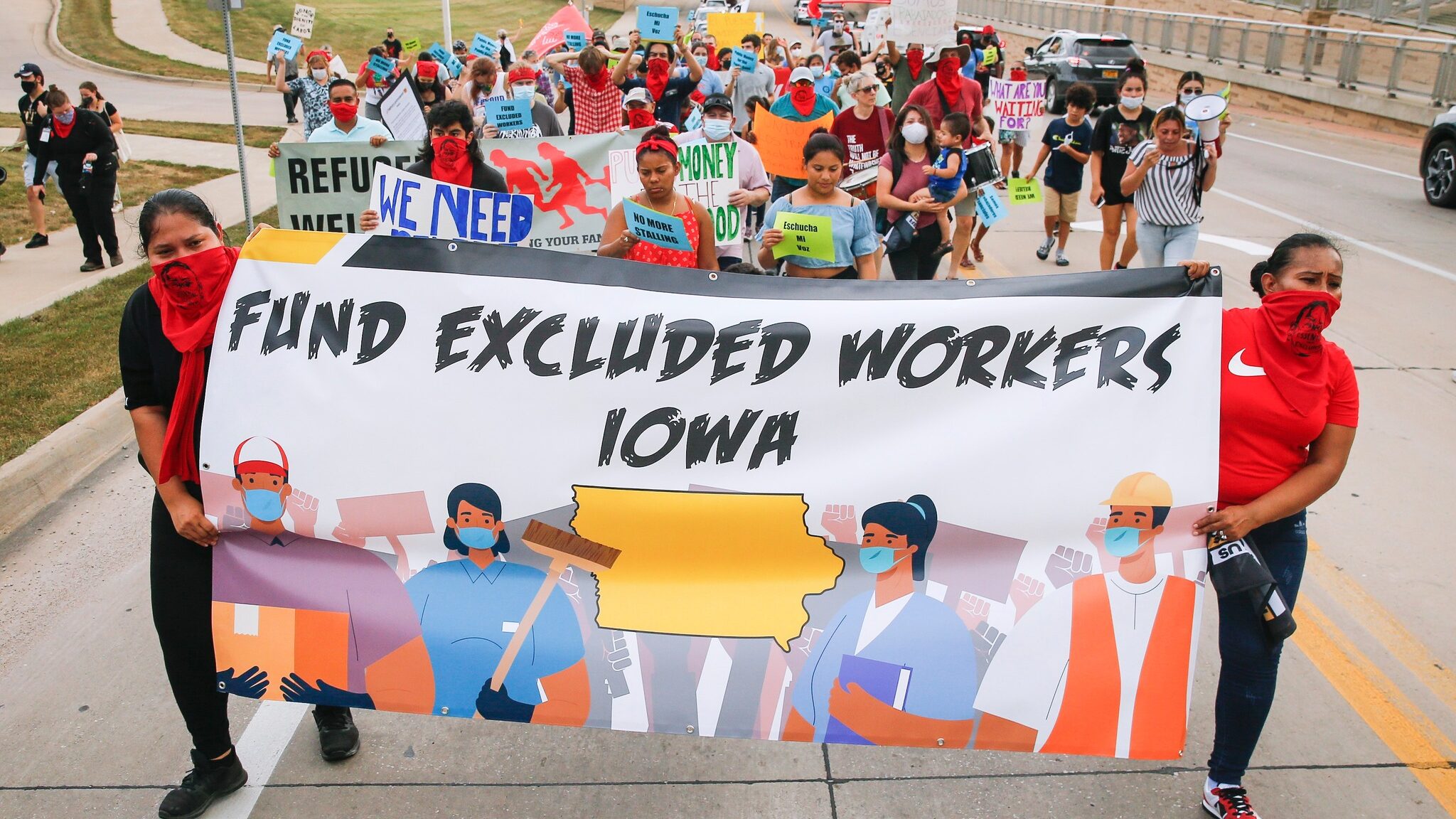Advancing Racial Equity with the American Rescue Plan Act’s Local Fiscal Recovery Funds: Case Studies
admin2023-04-11T16:16:14-04:00A Better Balance
Chloe2022-12-15T15:47:17-05:00A Better Balance, a national nonprofit advocacy organization, uses the power of the law to advance justice for workers, so they can care for themselves and their loved ones without jeopardizing their economic security. Through legislative advocacy, direct legal services and strategic litigation, and public education, our expert legal team combats discrimination against pregnant workers and caregivers and advances supportive work-family policies like paid sick time, paid family and medical leave,
Iowans Fight For and Win Support for Utility Bills
Chloe2022-11-09T21:55:50-05:00
Project Overview
After more than a year of organizing and agitating by Escucha Mi Voz West Liberty members, the West Liberty City Council voted in November 2022 to invest $150,000 of their American Rescue Plan Act allotment into community needs.The $150,000 appropriation includes $120,000 for utility relief of $400 for 300 households.
Organizing Wins
City staff and attorneys resisted council’s attempts to create an Excluded Worker Fund, leading to five former city councilors signing a letter demanding the former mayor resign. The utility relief plan was proposed as an alternative by the West Liberty Economic Development Association and almost instantly adopted by staff and council. The vote by City Council in November 2022 was backdropped by a standing-room-only crowd of dozens of West Liberty immigrant workers, meatpacking plant workers, and farmworkers, six of whom delivered public comments in Spanish about the impact the pandemic had on them and why they needed relief. “This is happening because we fought and won relief,” said Edgar Velasquez, a grocery store worker and West Liberty homeowner. “But it doesn’t matter what the city promises, only what they do. Together, we will make sure this money gets into the hands of the people.” Escucha Mi Voz members say they will work with the West Liberty Ministerial Association to distribute the promised utility relief as soon as it’s available.
Equity Goals and Outcomes
“Since 2021, Escucha Mi Voz West Liberty members knocked on doors and organized meetings, marches, and public speak-outs to pressure the city of West Liberty to create an Excluded Workers Fund for immigrant workers ineligible for previous federal relief payments. In summer 2022, when utility bills began to skyrocket due to inflation, the group’s members started bringing copies of their utility bills to city council meetings as an example of why they needed relief.”
Guaranteed Basic Income: Lessons and case studies from implementation across the US and a recommendation for St. Louis
admin2022-12-01T21:20:32-05:00How One Childcare Worker Took ARPA Funds Into Her Own Hands to Win Grants for Home-Based Providers
Chloe2022-11-09T21:58:58-05:00
For Benu Chhabra, being a childcare provider is more than a job – it’s a calling. Chhabra has operated a home-based childcare center in Concord, California for 22 years and worked in the childcare field for nine years prior to opening her business. She is passionate about supporting children and their families.
“All of these families, they become like our extended family,” she says.
Unfortunately, families and providers alike struggle to get by with ever-increasing expenses. But Chhabra saw an opportunity in the State and Local Fiscal Recovery Funds from Biden’s American Rescue Plan – and she took it.
Chhabra is part of the Childcare Changemakers organizing program at Community Change, which advocates for making affordable, accessible child care possible for all families while also paying living wages for childcare providers.
Childcare providers like Chhabra have faced many daunting challenges over the past two years. She remained open throughout the entire pandemic because many of the families she serves are essential workers who needed childcare so they could keep working.
Expenses related to pandemic protocols put additional strain on Chhabra’s already stretched-thin budget and trying to obtain critical supplies was an expensive and time-consuming process.
“By the time we got to the stores, everything was gone, because we were not given a priority as essential workers at that time. So we drove at four o’clock in the morning, and everything was gone, so we drove further and stood in the rain to get one stack of paper towels or toilet paper,” she said.
Even without the additional challenges created by the pandemic, Chhabra and other family child care providers are caught in a no-win situation. They barely make enough to cover their expenses – but increasing their revenue would mean raising their fees, and the families they serve are already struggling to afford the costs. “Childcare is their second biggest expense,” Chhabra says.
The biggest challenge is staffing, Chhabra says. It is difficult to find and keep good workers because she can’t pay enough or offer benefits – meaning she can’t compete with other potential employers like retail stores or fast-food restaurants. “They can go to Peet’s Coffee, which is paying $20 an hour or more.”
Universal childcare and a significant federal commitment to supporting childcare workers and ensuring they earn a reasonable wage would greatly alleviate many of the obstacles that Chhabra and other childcare providers face.
Meanwhile, access to grants funded by federal legislation passed last year could help home-based childcare providers in Concord.
Concord received an allocation of $27 million in ARPA State and Local Fiscal Recovery Program funds, of which $8 million has already been spent. At its council meeting in September, the Concord City Council continued its discussions about how it plans to use the remaining funds.
In preparation for this meeting, childcare providers in the area organized to ensure their voices were heard by local officials. In the city’s tentative plan to distribute grants to local small businesses impacted by the pandemic, home-based businesses wouldn’t have been eligible to apply for grants, but Chhabra and other local childcare providers launched an effort to lobby for an exception to be made for home-based family childcare centers. They spoke at Council meetings, initiated a letter-writing campaign, and worked to raise public awareness about the hardships faced by many home-based childcare providers.
Their efforts paid off. During that September meeting, Assistant City Manager Justin Ezell – who presented a report from the Council Ad Hoc Committee overseeing the American Rescue Plan Act Investment Plan – noted, “The Ad Hoc Committee heard loud and clear that family childcare homes struggled during the pandemic, and therefore these homes will be eligible for these funds, so long as they are state-licensed and have been operating since June 30, 2020.”
Councilmember Tim McGallian even thanked Chhabra specifically for her advocacy and bringing together parents and providers on this issue.
Concord City Council approved the Ad Hoc Committee’s recommendation for a plan that earmarks $2 million to support small businesses, in the form of grants of $5,000 that would help reimburse the cost of allowed expenses. Home-based childcare providers were deemed eligible to apply for these grants and they were only required to be licensed by the state – they didn’t need to have a city business license, which would have been a problem for many of them.
While she is relieved about this City Council decision, Chhabra isn’t done yet. This victory has motivated her to set her sights higher and continue the momentum she and other organizers have achieved. Next up: Contra Costa County. “The county has this pot of money sitting there, too. So we’re going to try to go for that, for our providers,” Chhabra said.


